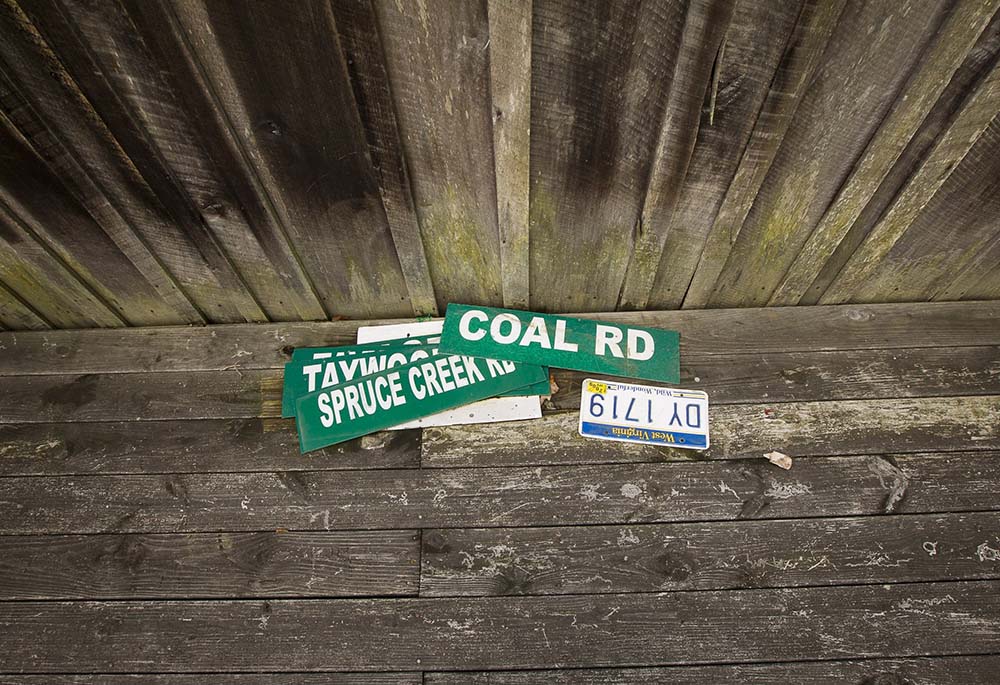
Road signs rest on the side porch of a house near Kermit, West Virginia, Aug. 20, 2014. The Supreme Court ruled in West Virginia v. Environmental Protection Agency on June 30, 2022, to limit the Environmental Protection Agency's ability to regulate carbon emissions from power plants. (CNS/Tyler Orsburn)
The U.S. Supreme Court's decision last week to curtail the Environmental Protection Agency's ability to regulate greenhouse gas emissions from power plants was met with disbelief and disappointment by Catholic and other faith groups, calling it "a moral travesty" with serious repercussions for both people and the climate.
The consequential ruling, issued June 30 in one of the final cases of a monumental term for the court, dealt a major blow to one of the federal government's tools to reduce the heat-trapping gases, which are driving climate change, from one of the nation's largest emitting sources: coal- and gas-fired power plants. It also raised questions about what leeway other federal agencies will have to interpret laws and directives they've been tasked to enforce.
In a statement, the Catholic Climate Covenant said it was "deeply disappointed" by the Supreme Court's decision.
"We know the emission of carbon dioxide through the burning of fossil fuels is one of the largest causes of the climate crisis," said Catholic Climate Covenant's executive director, Jose Aguto, pointing to rising global temperatures that are driving more dangerous and frequent droughts, heat waves and extreme weather events.
"We must bring these emissions down. Yet today, the Supreme Court chose to limit EPA's authority to regulate these emissions, rendering less resourced our collective imperative to care for creation and address the climate crisis. We ask: how is this decision upholding the life and dignity of every person?" he said.
In a 6-3 decision in West Virginia v. Environmental Protection Agency, with the conservative justices — five of whom are Catholic — all in the majority, the court ruled that EPA acted without explicit authority from Congress when it issued in 2015 the Clean Power Plan, which sought to reduce emissions from the power sector.
That rule never went into effect — the high court put it on hold in 2016, before the Trump administration rescinded and replaced it with a weaker version, which was then blocked by an appeals court days before President Joe Biden took office. But Republican state attorneys general and coal companies still sought the court's intervention. Environmental groups viewed the effort as an attempt to limit EPA's power in future emissions-reductions rules, including one the Biden administration is currently crafting.
"Capping carbon dioxide emissions at a level that will force a nationwide transition away from the use of coal to generate electricity may be a sensible 'solution to the crisis of the day,' " Chief Justice John Roberts wrote in the majority opinion, referring to a past court precedent. "But it is not plausible that Congress gave EPA the authority to adopt on its own such a regulatory scheme in Section 111(d) [of the Clean Air Act]."
"A decision of such magnitude and consequence rests with Congress itself, or an agency acting pursuant to a clear delegation from that representative body," Roberts wrote.
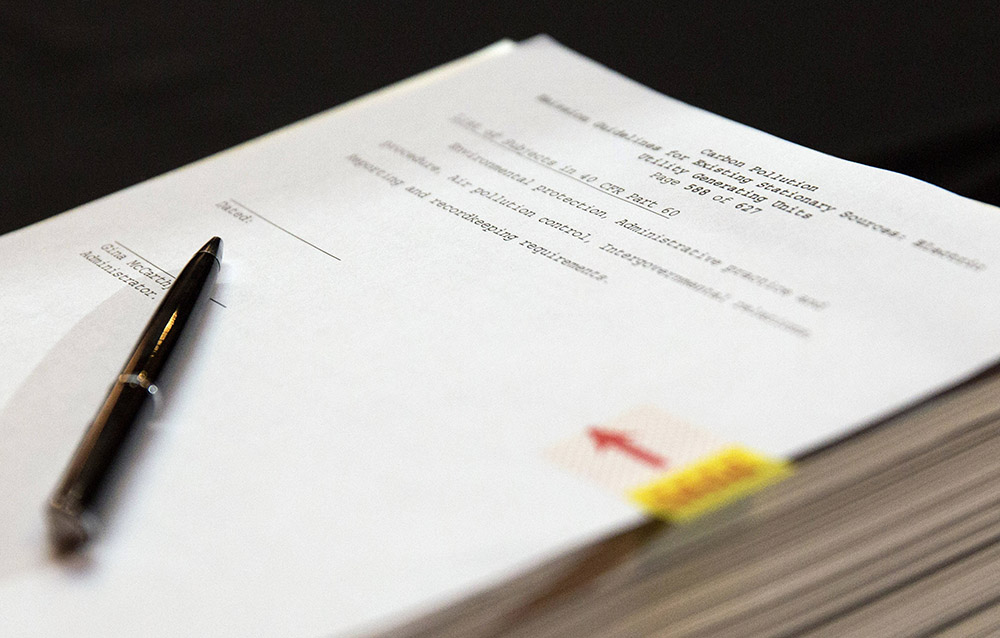
The proposal under the Clean Air Act to cut carbon pollution from existing power plants is seen before a news conference in Washington June 2, 2014. (CNS/Reuters/Joshua Roberts)
The majority justices based their decision on the "major questions doctrine," which Roberts said stipulates direct authorization from Congress for federal agencies to act on matters of "economic and political significance." The chief justice wrote that the Clean Air Act directed EPA to regulate polluting sources to operate more cleanly, "not to direct existing sources to effectively cease to exist."
In a scathing dissenting opinion, Justice Elena Kagan said the majority's decision strips EPA, the nation's primary greenhouse gas regulator, "of the power Congress gave it to respond to 'the most pressing environmental challenge of our time.' "
Kagan argued that utilities were already using the "generation shifting" approach that the majority called an overreach by EPA, and noted that many power companies supported the Clean Power Plan and EPA in the case.
"Whatever else this Court may know about, it does not have a clue about how to address climate change. And let's say the obvious: The stakes here are high," Kagan wrote. "Yet the Court today prevents congressionally authorized agency action to curb power plants' carbon dioxide emissions. The Court appoints itself — instead of Congress or the expert agency — the decisionmaker on climate policy. I cannot think of many things more frightening."
'An unwelcome obstacle'
While the decision hamstrings how EPA can regulate emissions from coal-fired power plants, it doesn't block the agency from imposing new rules on power plants at all or halt it from regulating greenhouse gases altogether — both big worries for environmental groups and lawyers following the case.
"It could have been much worse," Robert Verchick, the Gauthier-St. Martin chair in environmental law at Loyola University New Orleans, told EarthBeat.
Advertisement
Kate Zyla, executive director of the Georgetown Climate Center, in a statement called the decision "an unwelcome obstacle" that will make it harder for EPA to reduce emissions, making efforts at every level of government even more essential.
Tseming Yang, an environmental lawyer at Santa Clara University and director of its Center for Global Law and Policy, said in an email, "The decision is huge in that it shows how much the Supreme Court is willing to second-guess federal climate policies implementing federal environmental laws."
"The Court essentially thought the Clean Power Plan was too radical in its regulatory approach … instead of relying only on small incremental measures, such as efficiency improvements, to reduce greenhouse gas emissions. Of course, given the urgent need to address climate change, significant change is what is necessary," Yang said.
The U.S. is the largest historical source of greenhouse gas emissions, with a quarter of present-day emissions from electricity production, mostly through burning fossil fuels. Since the late 1800s, average global temperatures have risen roughly 1.1 degrees Celsius, and at current global emission rates the planet is on track to heat 1.5 C sometime next decade — a threshold scientists have said will bring about more dangerous heat waves, flooding, droughts and extreme storms.
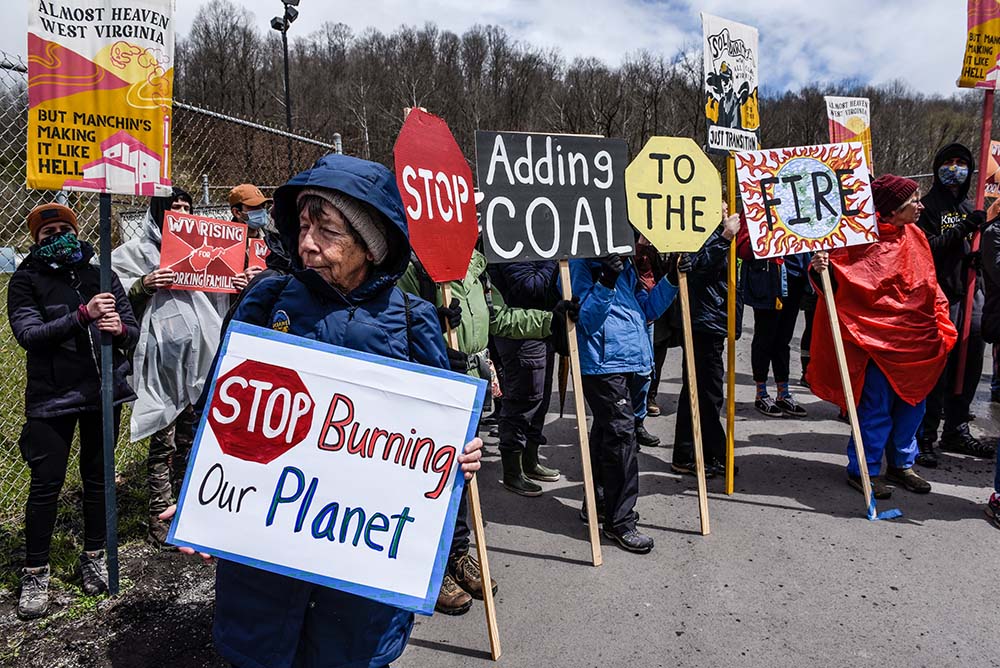
People in Grant Town, West Virginia, protest the Grant Town Coal Waste Power Plant April 9. (CNS/Reuters/Stephanie Keith)
EPA administrator Michael Regan called the West Virginia decision "disheartening" but added, "Make no mistake: we will never waver from that responsibility" to protect people's health from environmental pollution.
"While I am deeply disappointed by the Supreme Court's decision, we are committed to using the full scope of EPA's authorities to protect communities and reduce the pollution that is driving climate change," he said in a statement.
While the Clean Power Plan never went into effect, the country has still shifted away from coal. The U.S. Energy Administration reports that coal production has fallen 35% since 2015, and its share of power generation has fallen to 22% — lower than the Clean Power Plan's goal of 27% by 2030.
Verchick, who worked at the EPA from 2009 to 2010, called the ruling "a blow to the mechanisms by which agencies normally work." He said it undercuts EPA's ability to rely on its expertise in interpreting statutes and laws that Congress has directed it to enforce.
"Congress is not always able to pass a law the instant that we learn something new about a virus or about a pollutant, or about, you know, machinery that fails on the workplace. ... Since almost the beginning of the republic, the whole idea behind having agencies is that we give them directives, and that they act in ways that are flexible, and smart, and based on expertise to protect people," he said.
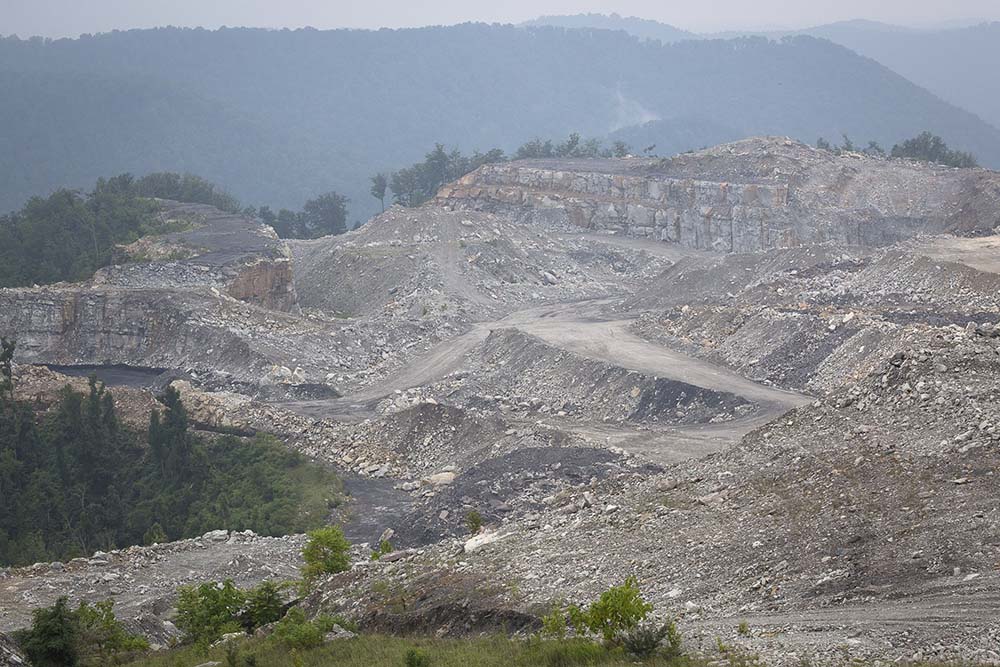
A mountaintop-removal coal mine on Kayford Mountain south of Charleston, West Virginia, is seen in 2014. (CNS/Tyler Orsburn)
Now, the West Virginia case appears to set a higher standard when a potential regulation could have major implications on the economy.
"It's hard to imagine an air pollution rule that doesn't have a significant effect on the American economy," Verchick said.
'A moral travesty'
From the proposal of the Clean Power Plan through the rulemaking process, faith groups were strong supporters of the plan. The Catholic Climate Covenant, along with the U.S. Conference of Catholic Bishops, lobbied on its behalf and issued letters and testimony endorsing its adoption.
In a statement, Archbishop Paul Coakley, chair of the bishops' conference committee on domestic justice and human development, said the bishops were "disappointed" by the court's interpretation of the Clean Air Act and the significant restrictions it will place on EPA's ability to regulate emissions from power plants. He added the bishops call on Congress to step in and provide EPA "the necessary authority to meaningfully regulate greenhouse gas emissions."
"Both reasonable regulation and legislation are critical for addressing the threat and challenges of climate change," Coakley said.
The Supreme Court's ruling in West Virginia v. EPA 'prioritizes polluters, especially the coal industry, over people.'
—Susan Hendershot of Interfaith Power & Light
Bill O'Keefe of Catholic Relief Services joined in calling on the other two branches of government to step up in light of the Supreme Court's decision, with which the judicial body "has failed to recognize the severity of the climate crisis."
O'Keefe, CRS' executive vice president for mission, mobilization and advocacy, said in a statement that the court's move has consequences outside the U.S., including in Africa's Sahel region from where he recently returned.
"In the Sahel and other vulnerable regions, climate-change driven catastrophes can decimate a country or a region, rolling back decades of progress against hunger and anti-poverty and costing the U.S. millions — if not billions — of dollars in emergency response funding. The Supreme Court's decision stands to aggravate these consequences on the most vulnerable," O'Keefe said.
Yang added that the decision could also dent U.S. leadership on the international stage if other countries view it as a sign that the United States isn't serious about achieving its commitments under the Paris Agreement.
Susan Hendershot, president of Interfaith Power & Light, called the decision "a moral travesty."
"Make no mistake, the Supreme Court's ruling today risks the lives of thousands of people by limiting the ability of the U.S. government to regulate carbon pollution from power plants. It prioritizes polluters, especially the coal industry, over people," she said in a statement.
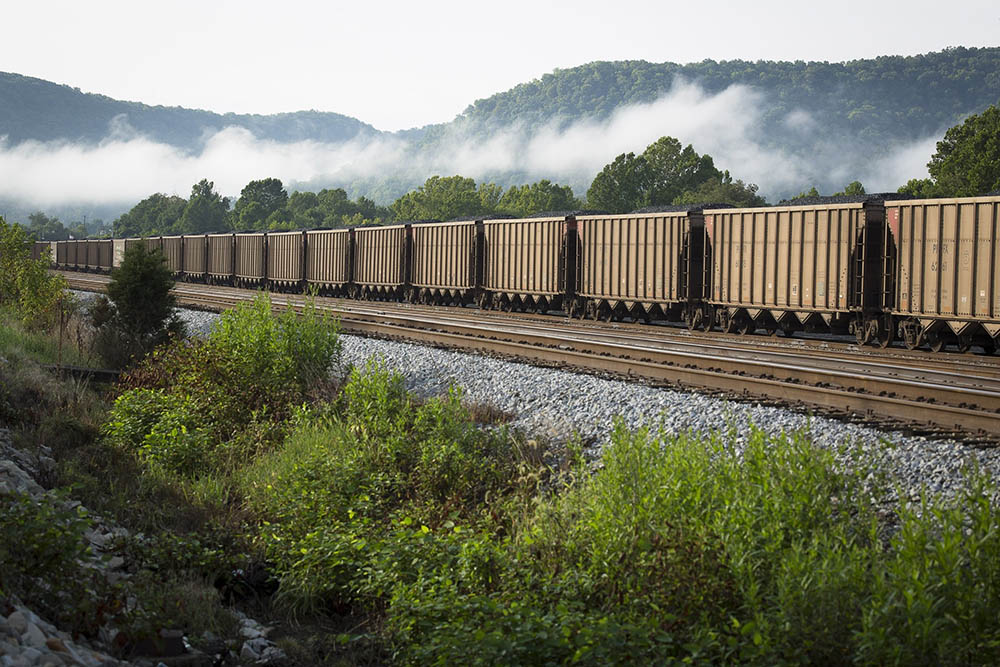
A train carries coal near Ravenna, Kentucky, in 2014. (CNS/Tyler Orsburn)
The Climate Justice Alliance said in a statement the Supreme Court decision will harm most the communities it represents — Black, Indigenous, Hispanic, Asian Pacific Islander and the poor — who are on the frontlines of the impacts of climate change.
"The Environmental Protection Agency, at minimum, should be able to regulate emissions, however now even that is being called into question with this ruling by the largely Republican-influenced Supreme Court," said its co-executive director Bineshi Albert.
The American Medical Association, which advocated in support of the Clean Power Plan, said that regulating and reducing greenhouse gas emissions is critical in addressing climate change — which it has declared a public health crisis — and also in reducing the toxins released into the air from burning coal that are "impacting the respiratory, cardiovascular, and immune systems of the U.S. population, with minoritized populations disproportionately impacted."
High concentrations of airborne pollutants like mercury, lead and sulfur dioxide have been linked to respiratory conditions like asthma, as well as neurological and cardiovascular issues and cancer. At the time the Clean Power Plan was rolled out, the Obama administration estimated it would prevent annually upward of 150,000 childhood asthma attacks, 3,300 heart attacks and 6,600 premature deaths.
"There are a lot of health impacts of burning coal," especially for those living near power plants, often due to past city planning and racist policies like redlining, said Indu Spugnardi, director of advocacy and resource development for Catholic Health Association.
'We ask: how is this decision upholding the life and dignity of every person?'
—Jose Aguto of Catholic Climate Covenant
More broadly, climate change is one of the major threats to human health, she added. "We need all the tools that are at hand to address this issue, and it's disheartening to see this limitation being put on the EPA to address such a major issue," Spugnardi told EarthBeat.
The West Virginia decision could have significance beyond the EPA, depending on how the court applies it in future cases involving federal agencies' ability to address societal problems.
On one hand, Roberts' opinion could be read as limited to a specific application of the Clean Air Act and what is and isn't allowed under that law in regulating greenhouse gas emissions, Verchick said. A broader reading, though, could extend it to other federal agencies, from the Centers for Disease Control and Prevention to the Department of Health and Human Services, and also rein in their capacity to make rules and take actions in their respective areas, as well as future EPA rules.
Already, Republican attorneys general have begun looking at other challenges to environmental rules under the major questions doctrine, including emissions standards for vehicles and requirements for publicly traded companies to disclose their emissions and climate risks.
"Roberts really is writing something that looks like it is chipping away at the regulatory state, chipping away at agency authority without blowing it up in one fell swoop," Verchick said.
"The question is, is this one chip or is this going to be the beginning of many chips?" he said.








